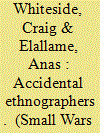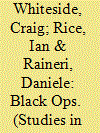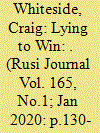| Srl | Item |
| 1 |
ID:
173831


|
|
|
|
|
| Summary/Abstract |
The disillusionment with U.S.-led counter insurgent efforts to gain a deeper understanding of social dynamics in countries with extensive tribal structures has led to a rejection of programs aimed to improve cultural competency. The Islamic State movement does not share this perception, and its strategists blamed its early failures during the U.S. occupation on a flawed understanding of tribal dynamics. This paper traces the political, ideological, and structural changes the leaders of the Islamic State movement made to adapt its approach toward the Sunni tribes of Iraq and later Syria, in order to develop a deeper base of popular support for its caliphate project. The group’s study of the tribes was done by a new tribal engagement office that put into motion an ethnographic study of tribal networks in key areas. There is evidence that the inspiration for this change came from its opponents. The Islamic State movement used these new insights to win a greater level of influence in rural areas, which in turn influenced its success in 2014. This research supports the idea that insurgency and counterinsurgency success often depend on which side is best at the incorporation of cultural and societal knowledge into policy and strategy.
|
|
|
|
|
|
|
|
|
|
|
|
|
|
|
|
| 2 |
ID:
181752


|
|
|
|
|
| Summary/Abstract |
This paper studies non-state militant group emulation and development of a special operation capability that stands in stark contrast to the normal repertoire of guerilla and terror tactics. Building on evidence of one well-documented Islamic State attack in 2012 that fit many of the criteria of a special operation, we analyzed the mission using concepts from strategic studies to understand the decision-making behind it. We then expanded our search of Islamic State operational claims looking for other examples, in order to understand the scope and frequency of Islamic State special operations since 2006. We found solid evidence of at least three Islamic State special operations over a decade: Ramadi, Iraq (2007), Haditha, Iraq (2012), and Abu Ghraib/Taji, Iraq (2013). Using these insights, we present two key levers – leadership and propaganda - used by the Islamic State in the decision-making and centralized distribution of resources to invest in a special operations capability that produced outsized strategic effects. These findings contest the conventional wisdom of the future of insurgency as decentralized structures made up of loose, leaderless networks.
|
|
|
|
|
|
|
|
|
|
|
|
|
|
|
|
| 3 |
ID:
147713


|
|
|
|
|
| Summary/Abstract |
The rise of the Islamic State (ISIS/ISIL) is not well understood at this point. This paper starts by comparing the Islamic State to the Vietnamese communists in a revolutionary warfare framework and makes a causal argument that the Islamic State’s defeat of the Sahwa (Awakening) movement in Iraq was the key to its successful establishment of control of most Sunni areas and the mobilization of its population for support. Islamic State operational summaries and captured documents are used to quantitatively establish the impact of the subversion campaign against the Sahwa and Iraqi government and trace the efforts of operatives in tribal outreach and recruiting. This research provides a valuable insight into the return of a powerful method of insurgency as well as a glimpse into the vast clandestine network that provides the strength of the Islamic State movement.
|
|
|
|
|
|
|
|
|
|
|
|
|
|
|
|
| 4 |
ID:
171673


|
|
|
|
|
| Summary/Abstract |
This article analyses the Islamic State media department’s involvement in deceptive influence efforts. Relying on an extensive database of the department’s products from its origins to the present (Tawhid wal-Jihad, Al-Qa’ida in Iraq, the Mujahidin Shura Council, the Islamic State of Iraq and ISIS), Craig Whiteside identifies situations when decisions are made to involve the media in deception efforts, and why. He finds that the Islamic State used deception infrequently and carefully, usually in a defensive manner, while carefully balancing the need for credible and truthful information activities outside its deception efforts.
|
|
|
|
|
|
|
|
|
|
|
|
|
|
|
|